Travel > Middle East
Middle East Destinations
Enigmatic Gateway to Antiquity
In the cradle of civilization, the Middle East unfurls its mysteries, beckoning you to a cultural feast of unparalleled grandeur. Egypt's pyramids stand defiant, captivating your heart and mind, while the intricate tapestry of faith intertwines amidst ancient city walls in Jerusalem. Petra, a rose-red testament to Nabatean ingenuity, reveals its secrets to your inquisitive spirit, while Istanbul's intoxicating blend of East and West allures with bustling markets, historic mosques, and tantalizing cuisine. These are some of the most popular Middle East destinations that retirees prefer.
Egypt
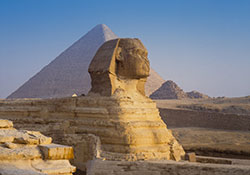
Photo by Adrian Dascal / Unsplash | For history aficionados, Cairo stands as a captivating tapestry woven with ancient wonders and modern vibrancy. Gaze in awe at the majestic Pyramids of Giza, a testament to human ingenuity and architectural brilliance. The Sphinx guards the pyramids with its enigmatic gaze, inviting contemplation on the mysteries of the past. Delve deeper into Egypt's history with a visit to the Egyptian Museum, home to an impressive collection of artifacts and treasures. |
Israel
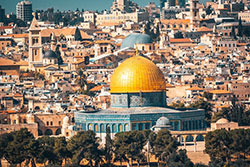
Photo by Raimond Klavins / Unsplash | As a revered city for three major religions, Jerusalem beckons with its profound spirituality and rich historical tapestry. Retirees with an appetite for culture and spirituality will find Jerusalem's ancient landmarks awe-inspiring. Embark on a journey through history by visiting the Western Wall, where prayers and wishes have been offered for millennia.
|
Petra, Jordan
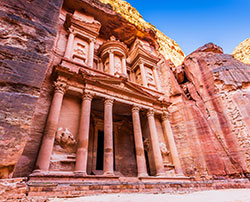
Photo by SCStock / Adobe Stock | A true gem of the Middle East, Petra captivates adventurous souls and history enthusiasts alike. Embark on an unforgettable expedition through this ancient Nabataean wonder. Admire the iconic Treasury, immortalized in movies, as you hike through the narrow Siq, a natural sandstone canyon. Discover hidden caves and tombs, uncovering the secrets of a lost civilization. |
Take a gentle stroll through the ancient streets, absorbing the mystical aura of Petra at your own pace. Revel in the remote desert setting and the tranquility it offers, making Petra a soul-soothing destination for travelers with a penchant for history and natural beauty.
Best time to visit: March to May (Spring) is an ideal time visit when the average temperature ranges between 60°F to 82°F (15°C to 28°C).
September to November (Autum) temperatures are also comfortable and range between 63°F to 84°F (17°C to 29°C). Note that the Summer months (June to August) can be scorching hot, with temperatures often exceeding 100°F (38°C), and the winter months (December to February) can be quite cold, with temperatures dropping to around 48°F (9°C) during the day and even colder at night.
|
Morocco
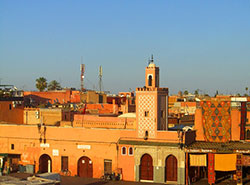
Photo by Sarah Lötscher / Pixabay | Immerse yourself in Moroccan culture and tradition in Marrakech, Casablanca, Meknes or Tangiers. Wander through bustling medinas, where colorful souks brim with exotic spices, intricate handicrafts, and captivating aromas. Delight in the rhythmic charm of Djemaa el-Fna, a lively square adorned with street performers, musicians, and storytellers. For a more tranquil experience, explore the Majorelle Gardens, an oasis of serenity amidst the city's bustle. |
A visit to the Koutoubia Mosque, with its soaring minaret, offers moments of serene reflection. Relish the delectable Moroccan cuisine in charming riads and indulge in rejuvenating spa treatments. Marrakech is a sensory delight that promises an enriching and captivating escape.
Best time to visit:
Spring (March to May) average temperatures range between 59°F to 82°F (15°C to 28°C). Autumn (September to November) temperatures range from 64°F to 83°F
(18°C to 28°C). Summers can get very hot, with temperatures often exceeding 90°F (32°C) or higher, while winters can be mild but may have occasional cooler days with temperatures around 55°F (13°C) during the day and lower at night.
|
Turkey
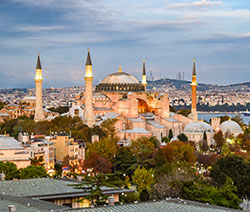
Photo by Nate Hovee / Adobe Stock | Turkey is an intriguiging blend of East and West and lures visitors with its historic landmarks and vibrant modernity. In Istanbul. wander through the Hagia Sophia, a breathtaking masterpiece that has transitioned from a Byzantine cathedral to an Ottoman mosque and now serves as a museum. The Blue Mosque, with its exquisite blue tiles, beckons travelers to witness the splendor of Ottoman architecture. |
For a more relaxed experience, meander through the bustling Grand Bazaar, where colorful stalls offer everything from spices to jewelry. Retirees can indulge in traditional Turkish baths, known as hammams, for a soothing and revitalizing treat. Enjoy culinary delights such as mouthwatering kebabs, flavorful mezes, delectable baklava, and sip aromatic Turkish coffee. Discover more top destinations in Turkey
Best time to visit:
Istanbul experiences a mix of climates due to its geographical location, with a Mediterranean climate in the south and a more continental climate in the north. The best time to visit is during the Spring (April to May) with temperatures between 50°F to 68°F (10°C to 20°C) and also Autumn (September to November) with temperatures between 57°F to 75°F (14°C to 24°C). Summer (June to August) can be hot and humid with average temperatures between 68°F to 86°F (20°C to 30°C), while Winter (December to February) is generally cold and wet with average temperatures ranging from 41°F to 50°F (5°C to 10°C).
|
United Arab Emirates:
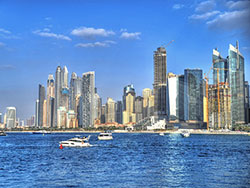
Photo by Danor Aharon / Pixabay | The UAE, offers a numerous culturally-rich destinations. Dubai sparkles with opulence and luxury, captivating travelers with its modern wonders and traditional charm. Retirees seeking an indulgent escape will find solace in the world-class amenities and warm hospitality of Dubai's luxurious hotels. Beyond the glitz, Dubai offers a plethora of enriching experiences. Relish a serene afternoon at Jumeirah Beach or venture into the desert for a thrilling safari, immersing yourself in the breathtaking golden dunes and romantic history of this enchanting cuntry. |
|
For those eager to glimpse the city from great heights, a visit to the iconic Burj Khalifa will leave you awe-inspired. The Dubai Mall invites you for a leisurely stroll through high-end boutiques and charming cafés, perfect for an afternoon of retail therapy. Dubai has it all, blending modernity with tradition to create an enchanting destination that caters to every retiree's desires.
|
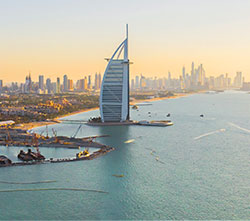
Photo by Tampatra / Adobe | Desert safaris often include various activities like Dune bashing, a thrilling ride over the sand dunes in a 4x4 vehicle. Bashingari packages also offer a traditional Bedouin-style camp experience, where you can enjoy cultural performances, delicious Arabic food, and stargazing in the tranquil desert setting. Safety is always a priority for tour operators in Dubai, and they adhere to strict guidelines to ensure a secure and enjoyable experience for all participants.
|
However, it's essential to choose a reputable and licensed tour operator to ensure a well-organized and safe safari adventure. As with any outdoor activity, it's advisable to follow the instructions of your guide and be aware of your surroundings to fully enjoy this unique desert adventure.
Best time to visit:
The cooler months in Dubai are betweem November to March, when the average temperature range is between 64°F to 87°F (18°C to 31°C). December to February are also comfortable, when temperatures typically range from 73°F to 79°F (23°C to 26°C). The hotter Summer months are June through September when temperatures can soar from 86°F to 108°F (30°C to 42°C).
|
Travel Planning Tips:
- Best Time to Visit: Spring or Winter is typically the best times to visit these countries to enjy cooler weather. Temperatures may vary by region.
- Regional Culture: Embrace the warmth and hospitality of the local people, experience traditional music and dance, and savor the flavors of Middle Eastern cuisine.
Transportation:
- Domestic Flights: Domestic flights are an essential mode of transportation for longer distances within the Middle East. Many reputable airlines, both national and regional, operate frequent flights between major cities and tourist destinations. Some of the prominent airlines include Emirates, Qatar Airways, Etihad Airways, and Saudia. Domestic flights are generally reliable, efficient, and provide a comfortable travel experience, making them an excellent option for covering vast distances quickly.
- Trains: While the railway network in the Middle East is not as extensive as in some other regions, certain countries have developed modern and efficient train systems. For example, countries like the United Arab Emirates have introduced high-speed train services, such as the Dubai Metro and the Abu Dhabi Metro. These train systems offer a convenient and eco-friendly way to navigate through major cities. Additionally, there are plans for expanding railway networks in some countries, aiming to improve connectivity within the region.
- Buses: Buses are a popular mode of transportation for both short and long distances within the Middle East. Many countries have well-established intercity bus services, connecting major cities and towns. Bus companies provide comfortable buses with air conditioning and amenities to ensure a pleasant journey. Buses are a cost-effective option for budget travelers and offer a practical way to access remote areas not served by other means of transportation.
- Ferries and Boats: Given the region's extensive coastline and presence of islands in countries like Bahrain and Oman, ferries and boats are commonly used for transportation. These services operate between various ports, offering scenic journeys and linking coastal regions with islands or neighboring countries. Ferries are particularly popular for traveling to and from iconic destinations like Dubai's Palm Jumeirah or the Pearl-Qatar in Doha.
- Taxis: Taxis are widely available in most Middle Eastern cities and towns, making them a convenient mode of transportation within urban areas. Taxis are usually metered, and it's advisable to ensure the meter is used or negotiate the fare before starting the journey. Taxis provide door-to-door service and are an efficient option for shorter trips or when public transportation is less accessible. Avoid unmarked taxis or unregulated transport options.
- Car Rentals: Renting a car is a viable option for travelers who prefer more flexibility and independence during their journey. Many international car rental companies operate in the Middle East, offering a range of vehicles to suit various preferences and budgets. However, keep in mind that traffic conditions in some cities can be challenging, so it's essential to be aware of local driving regulations and road safety.
Safety Tips:
- Research and Stay Informed: Before your trip, thoroughly research your destination and check the latest travel advisories from your government. Stay updated on any potential risks or safety concerns.
- Stay in Designated Tourist Areas: Choose accommodations in safe and well-known tourist areas. Be aware of your surroundings and avoid isolated or remote regions that may have security risks. Avoid walking alone at night, be careful about what you wear, and do not carry large sums of cash.
- Register with Your Embassy: Register your travel plans with your country's embassy or consulate in the Middle East. This allows them to contact you in case of emergencies or provide important updates. Follow any security advisories or travel warnings issued by your home country's embassy or consulate.
- Travel Advisories Stay updated on current events, local regulations, and any travel advisories when traveling abroad. Visit the US Government State Department Travel Advisories web site to check on the status of your destination.
- Enroll in the STEP Program: Travelers are also urged to enroll in the U.S. State Department's Smart Traveler Enrollment Program (STEP) to receive security messages and to make it easier to locate them in an emergency. The Department uses these security messages to convey information about terrorist threats, security incidents, planned demonstrations, natural disasters, etc. In an emergency, please contact the nearest U.S. Embassy or consulate or call the following numbers: 1 (888) 407-4747 (toll-free in the United States and Canada) or 1 (202) 501-4444 from other countries.
- Respect Local Customs and Culture: Familiarize yourself with the local customs and cultural norms. Dress modestly in conservative areas, and be mindful of local traditions, especially during religious events. Avoid discussing sensitive political or religious topics. Non-Muslims may not be allowed to enter some mosques or certain areas within them. Always ask for permission and follow any rules or guidelines when visiting religious sites.
- Photography Restrictions: Always ask for permission before taking photos of individuals, especially women and religious figures. In some places, photography might be restricted, especially near military or government buildings.
- Use Right Hand for Eating: In Middle Eastern culture, the left hand is considered unclean, so always use your right hand for eating and handling food. Similarly, avoid pointing or gesturing with the left hand.
- Avoid Alcohol Consumption in Public: Some Middle Eastern countries have strict alcohol laws, and public consumption of alcohol may be prohibited. If you wish to drink alcohol, do so in designated areas like hotels or licensed restaurants.
- Avoid Public Demonstrations: Stay away from political gatherings, protests, or demonstrations, as they can sometimes become unpredictable and potentially unsafe.
- Be Cautious with Personal Belongings: Keep your valuables secure and be vigilant in crowded places. Use a money belt or a secure bag to carry essential documents and money.
- Use Reliable Transportation: Opt for reputable transportation services and licensed drivers. Avoid unmarked taxis or unregulated transport options.
- Stay Hydrated and Use Sun Protection: The Middle East can have hot weather, so stay hydrated and use sunscreen, hats, and sunglasses to protect yourself from the sun.
- Drink Bottled Water: Stick to bottled water for drinking and brushing your teeth to avoid potential waterborne illnesses.
- Be Mindful of Food Safety: Enjoy local cuisine, but choose reputable eateries and avoid street food if you have concerns about its preparation and handling.
- Carry Important Contact Information: Have local emergency numbers and contacts readily available. Know how to reach your embassy or consulate in case of emergencies.
- Travel Insurance: Obtain comprehensive travel insurance that covers medical emergencies, trip cancellations, and other unforeseen circumstances.
Remember, these tips are general guidelines, and each country in the Middle East may have its own unique safety considerations. Always exercise caution, use your best judgment, and adapt your travel plans accordingly to ensure a safe and enjoyable trip.
| |
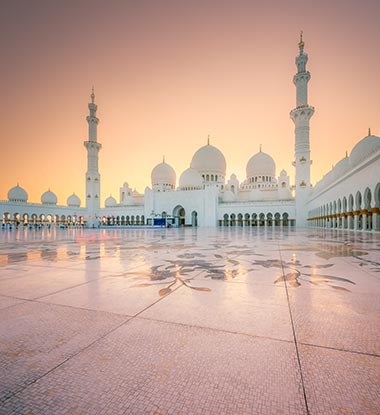 Sheikh Zayed Grand Mosque, Abu-Dhabi Photo by boule1301 / Adobe Stock
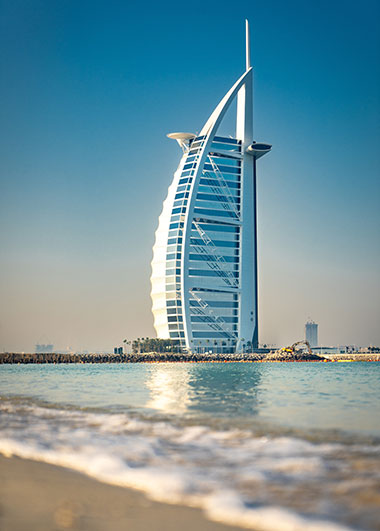 Photo by Darcey Beau / Unplash
 Photo by Büşra Şahin
|
 Sheikh Zayed Grand Mosque, Abu-Dhabi
Sheikh Zayed Grand Mosque, Abu-Dhabi Photo by Darcey Beau / Unplash
Photo by Darcey Beau / Unplash
 Photo by Büşra Şahin
Photo by Büşra Şahin 